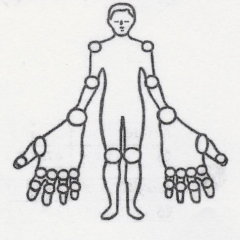Rheumatoid Arthritis
What is Rheumatoid Arthritis?
Rheumatoid arthritis is a chronic inflammatory disorder that typically affects the small joints in your hands and feet. Unlike the wear-and-tear damage of osteoarthritis, rheumatoid arthritis affects the lining of your joints, causing a painful swelling that can eventually result in bone erosion and joint deformity.
An autoimmune disorder, rheumatoid arthritis occurs when your immune system mistakenly attacks your own body's tissues. In addition to causing joint problems, rheumatoid arthritis sometimes can affect other organs of the body — such as the skin, eyes, lungs and blood vessels.
Although rheumatoid arthritis can occur at any age, it usually begins after age 40. The disorder is much more common in women. Treatment focuses on controlling symptoms and preventing joint damage.
Signs and symptoms of rheumatoid arthritis may include:
- Tender, warm, swollen joints
- Morning stiffness that may last for hours
- Firm bumps of tissue under the skin on your arms (rheumatoid nodules)
- Fatigue, fever and weight loss
Early rheumatoid arthritis tends to affect your smaller joints first — particularly the joints that attach your fingers to your hands and your toes to your feet. As the disease progresses, symptoms often spread to the wrists, knees, ankles, elbows, hips and shoulders. In most cases, symptoms occur in the same joints on both sides of your body.
Rheumatoid arthritis signs and symptoms may vary in severity and may even come and go. Periods of increased disease activity, called flares, alternate with periods of relative remission — when the swelling and pain fade or disappear. Over time, rheumatoid arthritis can cause joints to deform and shift out of place.
When to see a doctor
If you have persistent discomfort and swelling in your joints make an appointment with a Rheumatologist.
Menu
Dr. Charalampos Dragonas MD
Rheumatologist - Internist
Member of European Academy for Medicine of Ageing (ΕΑΜΑ)












